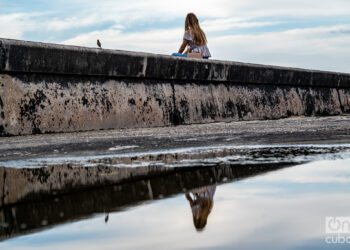The urban music duo Gente de Zona was excluded from a New Year’s Eve concert in Miami. Singer Haila was declared persona non grata and her performance in a private club canceled. The same happened to Jacob Forever and El Micha in the neighboring city of Hialeah.
They all have something in common: they are Cuban artists who have expressed their support for the island’s government or have not criticized it.
At a time when President Donald Trump is intensifying the embargo against Cuba, some members of the largest U.S.-Cuban community in the United States are again promoting a hardline cultural policy against artists they consider favorable to the Havana government..
Support for a policy of restrictions and sanctions against the island among the nearly 1.2 million Cubans living in South Florida could influence the 2020 presidential election. Partly because of the anti-communist position, Cuban-Americans have historically backed the Republican Party in an undecided state like Florida.
Although some surveys in recent years have shown that support for the embargo among members of the Cuban community in South Florida has weakened, some observers point out that Trump’s attempts to economically drown Cuba have emboldened activists who want more sanctions for the Cuban government waiting to generate a change in the island.
One of those activists is Alex Otaola, a 40-year-old Cuban actor who, from his daily television program broadcast on YouTube, Facebook and Instagram, has called for protests and concert cancellations, including those of Gente de Zona and singer Haila María Mompié.
Gente de Zona was excluded from a concert in a Miami public park because of its alleged closeness to the Cuban government after the duo asked for applause for Miguel Díaz-Canel and called him “our president” at a performance in Havana in 2018. Mompié has sung in political events in Cuba and in a concert in 2010 praised and kissed the late revolutionary leader Fidel Castro.
“These are artists who are linked to or have a relationship with the ‘Cuban dictatorship,’ who serve as instruments of ‘the dictatorship,’” said Alex Otaola, who arrived in Miami in 2003. “Enough of the double standards,” he said referring to the musicians who, in his opinion, defend the Cuban government while earning dollars in concerts in the United States.
Some Cuban-Americans interviewed by the AP agency in Miami said they disagree with cultural restrictions.
Carlos Nardo, a retiree who arrived from Cuba in 1970 and never returned to the island, said he did not support the cancellation of concerts and protests against the artists.
“It’s art, they’re artists,” Nardo said. “If they are against (the concerts), then they shouldn’t go to see them.”
On the other hand, others said they support cancellations of shows that could deprive the Cuban government of revenue.
“These people don’t come to sing,” said Carlos Fernández, a 65-year-old retiree who arrived in Miami in 1980. “These people come to help the government over there.”
The protests and cancellations are taking place at a time when the Republican administration of Donald Trump has rolled back the rapprochement to the island promoted by his Democratic predecessor Barack Obama (2009-2017), which softened travel restrictions, reinstated diplomatic relations and allowed the cultural exchange between artists from both sides.
Since taking office in January 2017, Trump has again imposed sanctions and restrictions claimed by the most conservative sectors of Miami’s Cuban exile, a small but influential group in local politics and coveted by politicians seeking their votes.
The concert of Gente de Zona was organized by Cuban-American artist and impresario Pitbull and was criticized by renowned Cuban exile musicians, including Willy Chirino and Arturo Sandoval. The duo was excluded after Miami Republican Mayor Francis Suárez asked the organizers to take them out of the program.
“You have to understand that an artist who speaks in favor of communism or gives credibility to communism is considered a persona non grata,” said Suárez in a brief written statement sent to AP. “It’s not about intolerance or censorship, it’s about respect and recognizing the deadly history of communism, especially in Cuba,” he said.
The mayor of Miami and the end of cultural exchange, mission impossible?
The city of Hialeah, with a large Cuban community and a few kilometers northwest of Miami, canceled the performance of reggaeton musicians Jacob Forever, Señorita Dayana and El Micha in a concert to celebrate independence day on July 4. The artists usually perform on the island and are considered close to the government.
The legislature of the city of Miami, for its part, approved a resolution in 2019 asking the National Congress to end the cultural exchange with artists from Cuba and Mayor Suárez declared Haila María Mompié a persona non grata.
“We’ve returned to the Cold War,” said Andy Gómez, a political analyst and former director of the Institute for Cuban and Cuban-American Studies of the University of Miami.
He said that a great deal of the offensive against Cuban artists was related to the 2020 elections, both local and national.
Local politicians “are gambling that those who shout and are passionate about Trump will vote for them in November,” he said.
During the Cold War years, between the 1970s and 1990s, the performance of Cuban artists or films in South Florida caused shootings and even bomb threats.
Haila avoided speaking out, but her son Haned Mota Mompié said on Instagram that “it is a great disrespect how politics has made us Cubans so small-minded and has turned us against each other.”
Gente de Zona did not respond to requests for comments from The Associated Press.
Cuba’s ambassador to Washington, José Ramón Cabañas, defended the artists. “Cultural terrorism? Miami politicians ask to exclude artists from Cuba from a local concert,” Cabañas wrote on Twitter when he learned that Gente de Zona could not perform.
Cuban-born businessman Hugo Cancio brought singers Silvio Rodríguez and Pablo Milanés to Florida during the presidency of Barack Obama and faced protests mainly from Cuban-Americans who arrived decades ago, but had no echo.
“It seems to me an act of total discrimination,” Cancio said of the current cancellation of concerts promoted by both young and old people.
They are censoring artists, he considered, “for the simple fact that the only crime they commit is to think differently and live in their home country.”











